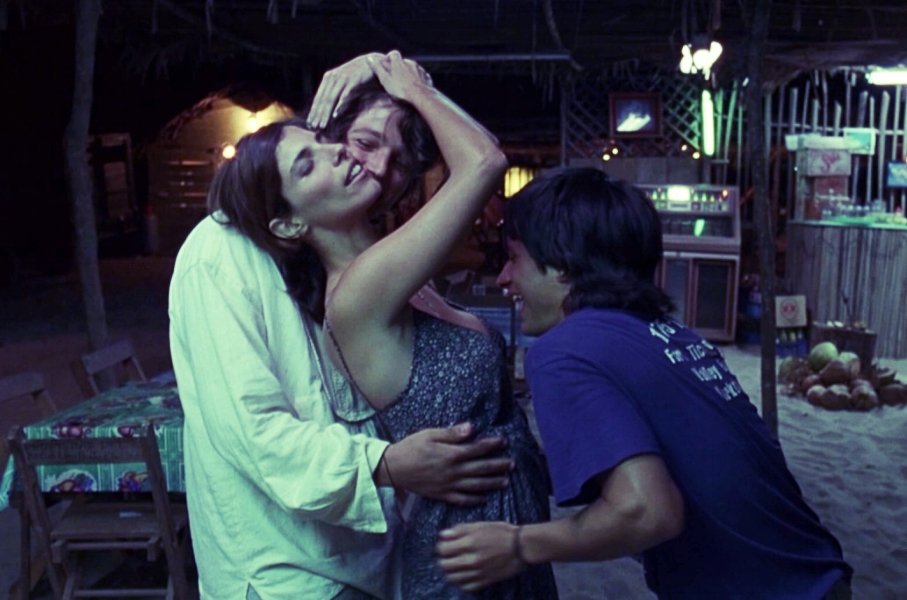Reading Lists
Electric Lit’s Best Poetry Collections of 2023
Gabrielle Bates, Sam Sax, Sally Wen Mao, and Edgar Kunz highlight a year of celebrated poetry collections

Among the exceptional writing brought to us in 2023, poetry has seen a renewed and necessary visibility. Whether you’ve listened to the soaring rallying cry from the picket line, or the way these collections have been a voice for the voiceless, one thing is clear: this has been a year of fierce and fearless poetry, existing on the frontlines of heightened social and political turmoil. Quite simply, the poets of today have shown up, and shown out, and we may never be the same.
The Top 4 Poetry Collections of The Year:
Judas Goat by Gabrielle Bates
Gabrielle Bates’s dazzling debut collection Judas Goat interrogates the complex intimacy of human relationships within the moody and forbidding landscape of the Deep South. These poems grapple with the coexistence of beauty and violence, the stifling societal demands placed upon motherhood and womanhood, and the intoxicating danger and power of religion. Spectral figures and domesticated animals yearning for the wild emerge from the darkness to haunt the collection, while Bates’s scintillating lyricism makes it a thrilling and unforgettable read. Read Bates’s reading list about seven acts of betrayal in literature.
Pig by Sam Sax
This conceptual collection investigates the multiplicity of meanings and associations surrounding the pig as a metaphor for masculinity, police violence, desire, queer identity, agriculture, and religion, positioning it within both personal and global histories of power. Sam Sax crafts a collection of arresting poems whose subjects range from drag queens to pig farming, forcing the reader to confront their own preconceived expectations of the pig’s symbolic meaning. These nuanced portraits of the pig’s many cultural associations offer a startling glimpse into human nature. Read two poems from the collection here.
The Kingdom of Surfaces: Poems by Sally Wen Mao
The Kingdom of Surfaces is a piercing exploration of how Chinese aesthetics were co-opted by Western culture during Chinamania and the nineteenth-century Aesthetic movement. Sally Wen Mao investigates the provenance of objects including porcelain, silk and pearls to open conversations about the history of Chinese women’s labor, the violence waged by the American empire, and anti-Asian discrimination during the COVID-19 pandemic. By examining the scope of Chinese art history, Mao raises important questions about the enduring nature of beauty, colonization, and legacies of violence. Read an interview with Mao about the collection.
Fixer: Poems by Edgar Kunz
Fixer takes as its subject the detritus of late-capitalist American life, from robots to temp jobs to conspiracy theories. The central poetic sequence explores the death of the poet’s estranged father and its lasting impact on his sons in a moving rumination on familial connection. This searing, darkly humorous collection investigates the nature of labor and asks what it means to build lasting homes and relationships. Read three poems from Kunz here.
The Best Poetry Collections of the Year:
I Do Everything I’m Told by Megan Fernandes
I Do Everything I’m Told is narrated by a restless speaker on a solo journey around the world as she engages in unexpected encounters with strangers and speculates on the nature of sexuality and desire. The speaker maps her own erotic geography while traveling through Shanghai, Brooklyn, Los Angeles, Lisbon, Palermo, Philadelphia and Paris. These poems dislocate space and time to navigate a landscape of complex and ambiguous intimacies populated by a wide-ranging cast of characters from both the speaker’s imagination and reality.
I Done Clicked My Heels Three Times: Poems by Taylor Byas
I Done Clicked My Heels Three Times adapts the cult classic The Wiz to spin a moving coming-of-age narrative about a Black woman’s journey out of the South Side of Chicago. Although the plot trajectory remains the same, the fantastical setting is replaced by the more familiar landscapes of a Wendy’s drive-thru, a Beyoncé video, and the speaker’s grandmother’s house. Along the way, the speaker must confront her relationship to her gender, race, sexuality and family history through an innovative sequence of sestinas, sonnets and erasures that reimagine the concept of home.
Above Ground by Clint Smith
Clint Smith’s new collection navigates the precarious and shifting landscape of fatherhood by exploring the ways our lives are shaped by both family history and the greater scope of the past. Meditating on the challenges of raising a family in a tumultuous era and rediscovering the world anew through his children’s eyes, Above Ground questions how joy and despair can coexist at once. Smith’s poems bring the reader on an evolving journey through his children’s early life as they learn to navigate the complicated and ever-changing world around us.
Promises of Gold by José Olivarez
Promises of Gold grapples with the broken promises of the American dream to investigate types of love ranging from self love to brotherly and romantic to familial and cultural. Inspired by his experiences as a second-generation Mexican immigrant, Olivarez reminds us that “love is abundant” all around us. Reckoning with the legacy of colonialism on the lives of the Mexican diaspora, the collection is also a humorous, empathetic exploration of interpersonal relationships that is paired with a Spanish translation by poet David Ruano González. Read an interview with Olivarez.
Trace Evidence by Charif Shanahan
Trace Evidence is a searing examination of the complexities of mixed-raced identity, queerness and the historical legacies of anti-Blackness. With vibrant lyricism and touching empathy, these poems narrate the impact of a violent colonial past on ordinary life through language that meditates on the nature of home, belonging and fate. Shanahan urges the need for intimacy and connection to ensure the survival of humanity while reckoning with the outside forces placed upon one’s identity. Read an interview with Shanahan here.
The Diaspora Sonnets by Oliver de la Paz
In this innovative collection of sonnets divided into three sections—“The Implacable West,” “Landscape with Work, Rest, and Silence,” and “Dwelling Music”—The Diaspora Sonnets explores the poet’s Filipino immigrant family’s resilience and search for belonging. After their relocation to the United States, their migration continued as they continually moved across the country in search of work, a vast terrain this collection deftly navigates. Oliver de la Paz breaks and reconstructs the traditional form of the sonnet throughout the collection to give voice to the Filipino diaspora’s search for the security of home and a sense of belonging.
Chrome Valley by Mahogany L. Browne
Celebrated poet Mahogany L. Browne returns with this bold, unflinching celebration of Black womanhood across generations. Exploring generational trauma, the eagerness of girlhood, and the strength of inheritance, Chrome Valley is a necessary beacon of hope during troubling times.
A Working Life by Eileen Myles
LAMBDA Literary Award winner Eileen Myles’s new collection shines a light on snippets of everyday life we thoroughly missed at the height of the pandemic. Read an interview with Myles on writing about the Internet and the need for collectivity of voices in poetry and language.
Couplets: A Love Story by Maggie Millner
Like the title suggests, this debut is a story-in-verse, consisting of couplets about love, queerness, and self-discovery. With this twist on an iconic rhyme scheme, Millner shows the transformative power of new love.
All Souls by Saskia Hamilton
A rich glimpse into life and memory, this posthumous collection is both questioning and resolute as it traverses the difficult landscape of illness, and eventually, mortality. Read All Souls and be reminded of your life in the here and now.
So to Speak by Terrance Hayes
National Book Award winner Terrance Hayes’s seventh poetry collection is clever, experimental, and energetic as it explores being a Black artist, influential Black icons across history, and the trauma of the murder of George Floyd. This collection is published concurrently with Hayes’s Watch Your Language.
The Iliad translated by Emily Wilson
Wilson returns to Ancient Greece with a new translation of Homer’s epic poem on the Trojan War. The first woman to translate The Odyssey in English, Wilson revamps The Iliad for the modern day.
The Lights by Ben Lerner
MacArthur “Genius Grant” recipient Ben Lerner’s new collection is fifteen years in the making. Encapsulating fatherhood and family, the pandemic, and making sense of uncertainty, The Lights concerns itself with the tenuous world of today. Read a profile on Lerner and his novel Leaving Atocha Station.
To 2040 by Jorie Graham
In the face of a global climate crisis, can you delay the inevitable? Pulitzer Prize winner Jorie Graham’s new collection is both a call to action and an existential glance at the potential fate of the world.
Ursula K. Le Guin: Collected Poems by Ursula K. Le Guin
An icon of science fiction and fantasy writing for her Earthsea series, Ursula K. Le Guin’s poetry is collected for the first time in this 40-poem volume. Read this essay on Le Guin and navigating womanhood under patriarchy.
From From by Monica Youn
An unflinching interrogation of anti-Asian hate written in the midst of the pandemic. Finalist for the National Book Award for Poetry Monica Youn’s collection scrutinizes forming Asian-American identity outside of the Western gaze.








